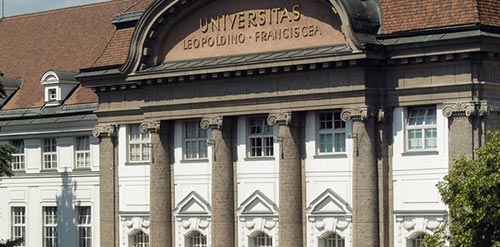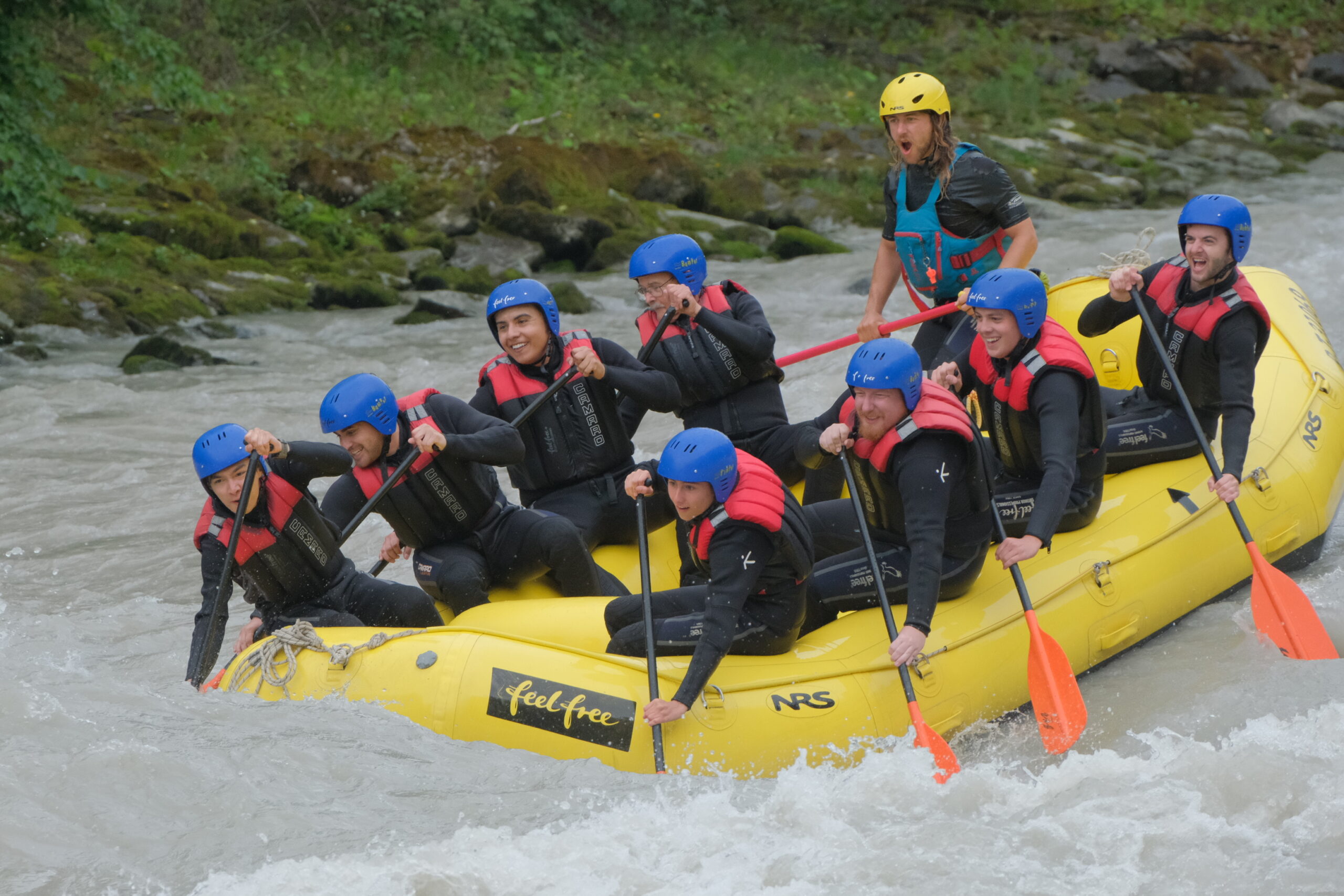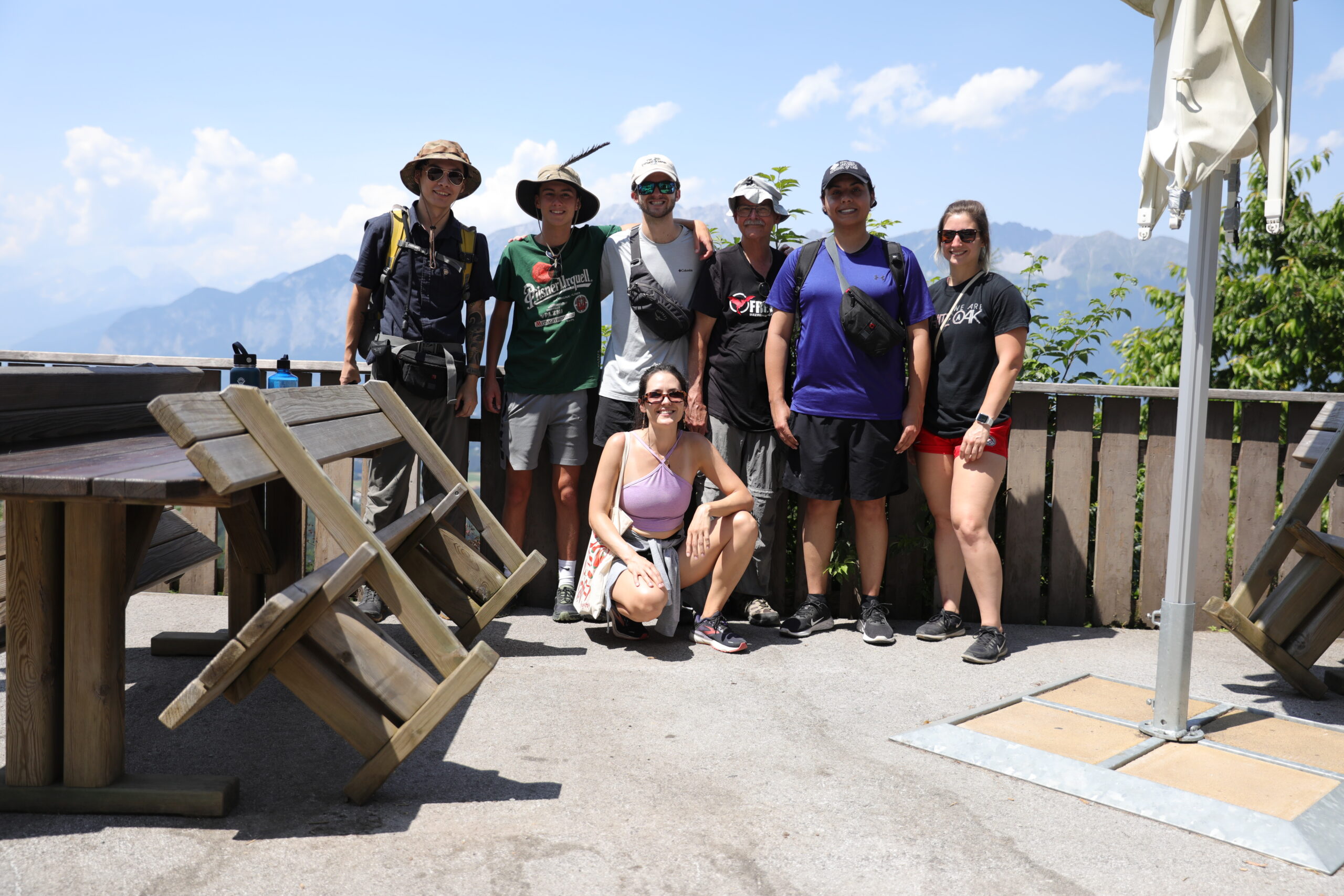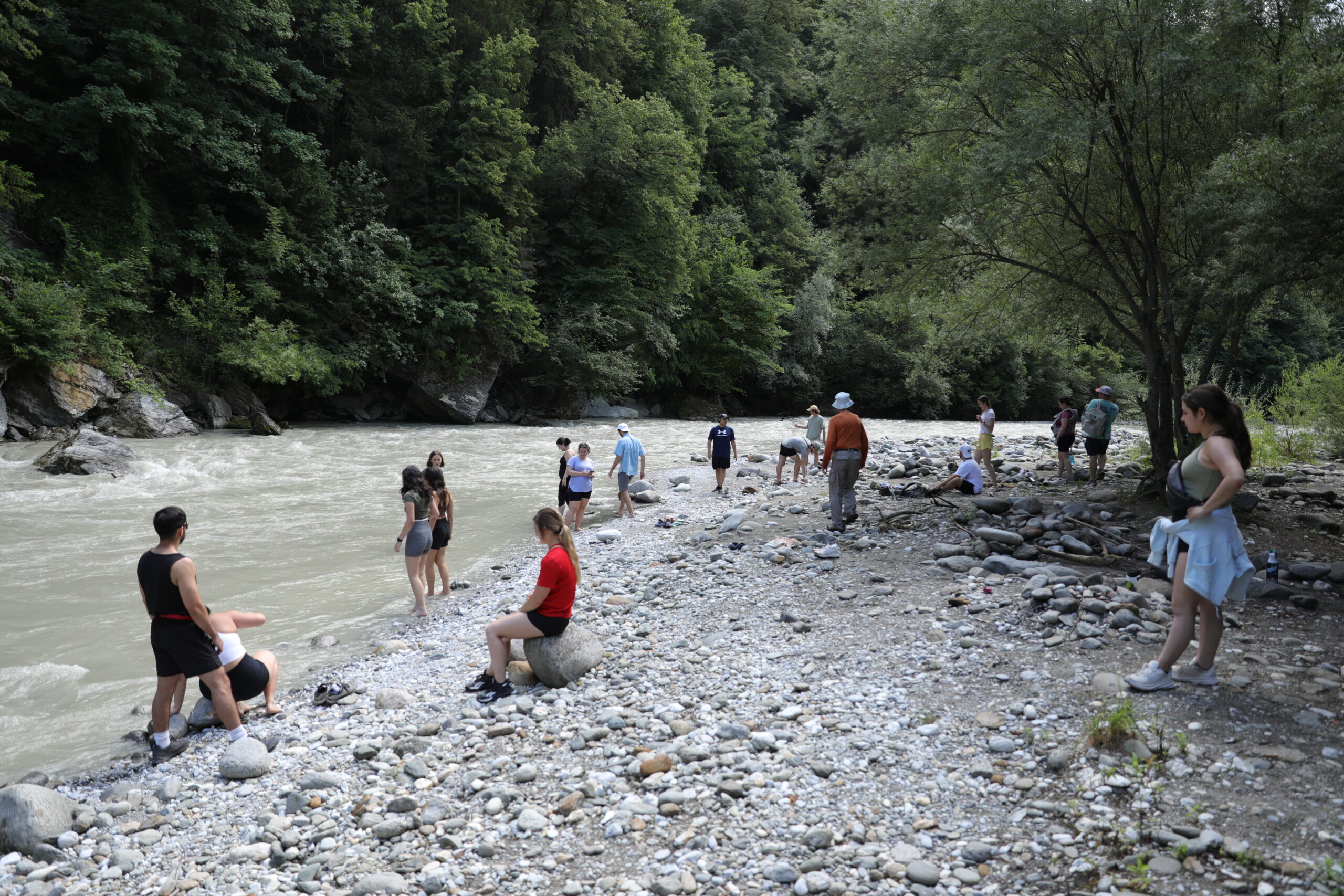Summer Study Abroad Program in the Alps
In 2026, St. Mary’s University and its European partner, the University of Innsbruck, will mark the 40th year of the St. Mary’s Institute on World Legal Problems in Innsbruck, Austria. The dates for 2026 are June 29 to July 31.
Since 1986, students from more than 130 American law schools and several European and Asian law schools have participated in the Institute, whose courses are conducted in English. One of the longest continuously operated summer law study programs offered by any American law school, the Institute continues in its commitment to offer a First-Class International Law Education in a World-Class Location.
Students in good standing at any ABA- or state-approved law school are eligible to enroll.
Studying Law Abroad
Participants visit local government offices and the state seat of government, and guest lectures typically are presented by European professors. Scholars traveling in Europe and lawyers abroad on international business often are invited to share insights with the classes or deliver special lectures on important international topics.
Students have the opportunity to converse with foreign scholars and Austrian lawyers on several occasions. Austrian students will participate in classes, off-campus visits, and social events, along with their American colleagues.
Browse through photos and videos of places Innsbruck students have visited on day trips, find updated information, and learn more:
ABA ACCREDITATION
The St. Mary’s University summer program in international law at the University of Innsbruck has been fully accredited by the American Bar Association since its inception in 1986. The St. Mary’s University School of Law is approved by the Council of the Section of Legal Education and Admissions to the Bar of the American Bar Association, 321 North Clark Street, Chicago, IL 60654, 312-988-6738.
As part of the accreditation process, the ABA requires law schools to make certain information available to students planning to participate in foreign programs. The following information is set forth to comply with those requirements.
SIZE OF ENROLLMENT
An average of 50 students have participated in each of the last 10 programs at Innsbruck. There will likely be a similar enrollment in the current year. Because the curriculum contains five courses, it is probable that most classes will have an enrollment of between 10 and 30 students.
Although there is no definite limit on the number of students who may participate in the program, at some point adequate student housing might not be available and the students enrolled for a class might exceed the capacity of the largest classroom available (about 150).
FOREIGN STUDENTS
Each year several students from foreign countries participate in the St. Mary’s program. There are usually no more than 10 foreign students in the program. They are typically drawn from Austria, Germany and other European countries.
Because at least one of the classrooms that will be used by the program seats 150 persons, it is unlikely that the enrollment in any course will have to be limited. There are no course prerequisites for any of the classes. Each class is taught with the assumption that the students have completed one year of American legal education.
PERSONS WITH DISABILITIES
Some portions of the classroom building at the University of Innsbruck, and many public accommodations in Austria, are not readily accessible to persons with disabilities. Specific information about the obstacles a person with a disability would be likely to encounter can be obtained from the director of the program, by phone or mail.
FACILITIES AND CONTACT

The University of Innsbruck is the foreign sponsor for the St. Mary’s University Institute on World Legal Problems, and may be contacted through: Professor Bernhard Koch, University of Innsbruck, Innrain 52, A-6020 Innsbruck, Austria, Telephone (011-43-512) 507-81210 or per email to Bernhard.A.Koch@uibk.ac.at.
Offices, study areas, and classrooms are comfortably housed in the main building of the University. Students have access to the international and comparative law collections of the University libraries. Selected American works are also available and students are provided Internet access through the University of Innsbruck.
The classrooms and administrative offices for the St. Mary’s University Institute on World Legal Problems are located in the main building of the University of Innsbruck. The facilities available to the program include a large faculty office, a small student library/study room with several tables and chairs, and several large and small classrooms with bench-type seating. Students may use the library and computing facilities of the University of Innsbruck, and will have internet access through the University’s wifi network.
FACULTY AND ADMINISTRATION
The Institute is conducted under the co-direction of Professors of Law Chad Pomeroy and Genevieve Fajardo. Professor Pomeroy is an expert in property and mortgages. Associate Dean Fajardo is a clinical professor and expert in housing and consumer protection.
Please call Sabrina Martinez at 210-431-6878 if you have any questions.
Summer Program Tuition and Costs
The tuition in Innsbruck is the same as at the home campus of St. Mary’s University, which currently is $1,558 per credit. There are no special fees, but students must purchase any books required for their courses.
In addition to tuition, students must pay for transportation, housing, and living expenses. Last summer most students found that a round-trip flight from the United States to a major European city cost about $1,500 to $2,200. Many students purchase a Eurail pass to enable them to travel by train.
SUMMER STUDY ABROAD SCHOLARSHIP
Innsbruck Program Scholarship Information
We are proud to announce that Summer 2026 will mark the 40th year of the St. Mary’s Institute on World Legal Problems. This program is held annually in the breathtaking Innsbruck, Austria. We are proud to offer the following scholarship opportunities for students seeking to attend this summer.
You can apply for all five scholarships, but it is important to note that each scholarship has its own requirements and financial aid resources. Each scholarship offers varying financial aid amounts to a varying number of applicants. There are scholarship committees that oversee the completed applications and the scholarships are distributed to as many law students as possible.
We are now accepting scholarship submissions through 5 p.m. Sunday, March 22, 2026.
If you have any questions, please reach out to Sister Grace Walle, F.M.I., D.Min.
Sarah Thompson Memorial Fund Scholarship: This scholarship carries on the memory of Sarah Thompson. Thompson was a third-year law student at St. Mary’s who died in a hit-and-run accident. Thompson’s parents started this scholarship to honor Thompson since she loved her Innsbruck study abroad experience. Applicants should demonstrate financial need. Thompson was a Texas Tech University graduate and applicants with degrees from Texas Tech may be given preference.
Flint Fund Scholarship: This scholarship is funded by Richard Flint, J.D., (M.A ’07), Albert Hermann Professor of Law at St. Mary’s, who has taught International Business Transactions in Innsbruck for many years. If selected, recipients must promote, plan and attend the Flint Fest BBQ Fundraiser. Recipients are also required to attend group hiking trips and/or Catholic Mass with Flint while in Innsbruck.
Clayton, Ramirez & Null Scholarship: This scholarship is generously funded by the Clayton, Ramirez & Null law firm. Garrett Clayton (J.D. ’06) attended Innsbruck while in law school, and the law firm wants law students — particularly those who have not previously traveled to Europe and could not otherwise afford the costs — to have the opportunity to benefit from this unique international legal experience.
Founders Fund Scholarship: This scholarship honors the professors who founded the Innsbruck program in 1986. This scholarship is designed to encourage students to attend Innsbruck so this study abroad program can continue to benefit students. Applicants should demonstrate financial need.
Ariens Family Scholarship: This scholarship has been made possible by the generous support of Michael Ariens, J.D., LL.M., Aloysius A. Leopold Professor of Law at St. Mary’s, and his family. This scholarship is intended for students who have demonstrated financial need. Special consideration will be given to students who have not received an award from other Innsbruck scholarships.
MORE DETAILS
Students from St. Mary’s must enroll in not less than five credits, nor more than six credits. Students from other law schools can take no more than six credits and are subject to any minimum credit-hour requirement set by their home institutions.
The cost of food and meals in Innsbruck is approximately what a student might pay in the United States. Students must purchase books, if needed, for their courses before departing for Europe. The cost is the same as would be incurred for similar courses taken at a law school campus in the United States. Entertainment and travel expenses vary greatly from person to person. Most students travel on weekends. Those who spend their weekends enjoying the Innsbruck area attractions, many of which are free, will spend considerably less.
Students must apply separately for course enrollment and for housing. Enrollment applications are accepted on a first-come basis and must be accompanied by a $100 tuition deposit. Visiting students must submit a letter of good standing from an ABA- or state-accredited law school. Classes begin Monday, June 29, and students should arrive in Innsbruck no later than Monday, June 29. The last class is on Friday, July 31.
Course Information
The acceptance of any credit or grade for a course taken in the Innsbruck program is subject to determination by the student’s home law school. Students are urged to consult appropriate administrators at their own schools regarding the limitations on acceptance of credit earned in this program.
Classes meet Monday through midday Thursday. This schedule allows students time to travel on weekends to such destinations as Rome, Paris, the French Riviera, Venice, Vienna, Zurich, Munich, Prague, and Budapest.
Class Times
FIRST SESSION
International Business Transactions 8-9:10 a.m. (R. Flint)
Lawyering Abroad 9:20-10:30 a.m. (B. Koch)
International Refugee Law 10:40-11:50 a.m. (E. Schommer)
SECOND SESSION
International Business Transactions 8-9:10 a.m. (R. Flint)
International Recognition of Indigenous Rights 9:20-10:30 a.m. (B. Piatt)
International Asset Protection 10:40-11:50 a.m. (M. Dawson)
Class List
LAWYERING ABROAD
(1 credit, Professor Bernhard Koch)
This course, Lawyering Abroad: Basic Concepts of European Legal Systems, introduces the core elements of European legal systems and to their structural dissimilarities with American legal systems. Emphasis will be placed on major differences between common law and civil law approaches, and examples will be drawn from the laws of Germany, France, and other countries. Particular attention will be given to the practical aspects of lawyering, such as finding the law and communicating with foreign counsel.
INTERNATIONAL REFUGEE LAW
(1 credit, Professor Erica Schommer)
This course explores the origins of international refugee law and how States have implemented and interpreted the law over time. The course will begin with a review of the United Nations 1951 Convention and 1967 Protocol relating to the Status of Refugees. We will examine the refugee definition and the grounds of eligibility for protection (race, religion, nationality, political opinion and membership in a particular social group) that are applicable worldwide. The course will also study the role of the office of the United Nations High Commissioner for Refugees in interpreting and ensuring treaty compliance.
iNTERNATIONAL ASSET PROTECTION
(1 Credit, Professor Matthew Dawson)
This course will examine key considerations when establishing and administering offshore asset protection trusts, including international jurisdiction selection, competing jurisdictional interests, sovereignty and tax compliance. The course will also review transfers under the Uniform Voidable Transfers Act, whether asset transfers are protected under international repatriation treaties, and when U.S. Courts can exercise jurisdictions over offshore asset protection trusts and the related parties to the transactions. Additionally, comparisons between domestic and offshore trusts will be discussed, along with resulting civil and criminal penalties that may be imposed for those found to have used offshore planning to engage in fraudulent transfers, money laundering, and regulatory compliance avoidance.
INTERNATIONAL BUSINESS TRANSACTIONS
(2 credits, Albert Hermann Professor of Law Richard Flint)
This course will focus on the legal aspects of the most important forms of international commercial sales transactions, including the documentary sales transaction. The course includes an overview of the principal institutions involved in international sales transactions as well as of the principal forms of international commercial activity. It focuses primarily on the United Nations Convention on Contracts for the International Sale of Goods; UCC articles 2, 5 and 7; the Carriage of Goods by Sea Act; the Federal Bill of Lading Act, the UCP 600 (International Chamber of Commerce, Uniform Customs and Practices for Documentary Credits) and the International Chamber of Commerce INCOTERMS. It will also include discussion of other applicable treaties, conventions, and laws concerning the international commercial sales of goods; the laws governing the transportation of goods in international commerce; and the financing of international sales transactions.
INTERNATIONAL RECOGNITION OF INDIGENOUS RIGHTS
(1 credit, Professor Bill Piatt)
This course will examine the rights of Indigenous peoples and the corresponding obligations of member states of the United Nations, under the 2007 United Nations Declaration on the Rights of Indigenous Peoples (UNDRIP). We will consider how the United States, Canada, Australia and New Zealand have applied, and in many instances, ignored the provisions of the UNDRIP, as regards the first nations of those countries.
Student Performance
Regular class attendance is required. A student who misses more than one-fourth of the scheduled class meetings is automatically withdrawn from the course, and grades may be reduced for excessive absences. The grade in each course is based upon a final examination or paper. A portion of the final grade (not exceeding more than one-third of a letter-grade level) may be based on class participation, if the professor indicated on the syllabus. The grading scale is: A, A-, B+, B, B-, C+, C, C-, D, and F. Academic regulations are set forth in the Law School’s Student Handbook.
Request Information
Please fill out this form to request more information about studying law in Europe this summer.
Apply to the Innsbruck Program
The recommended application deadline is June 1, 2026.
TIMELINE
November – Applications and refundable tuition deposits begin to be accepted. Send your deposit and SSAN to Catherine Mery, Office of Law Admissions, St. Mary’s University School of Law, 1 Camino Santa Maria, San Antonio, Texas 78228-8603.
November to May – Make travel arrangements. Fares rise and fall, so when you find a good itinerary and fare, act quickly.
November to February – Make your living arrangements. Innsbruck housing is in heavy demand during the summer, so don’t delay reserving something.
February to March – If you will use financial aid for the Innsbruck program, check with your financial aid office to make arrangements.
March – Apply for Innsbruck program scholarships, if eligible.
April/May – Register for courses. This registration is done by a paper form you will receive, and cannot be completed online.
June – Be sure you have access to your course materials that are posted on Canvas, TWEN or in Dropbox. If you need to buy books, do it well in advance of your departure date.
Mid June – Leave in time to arrive in Innsbruck at least a day before classes begin. Remember that flights leaving the U.S. will arrive in Europe the following day.





